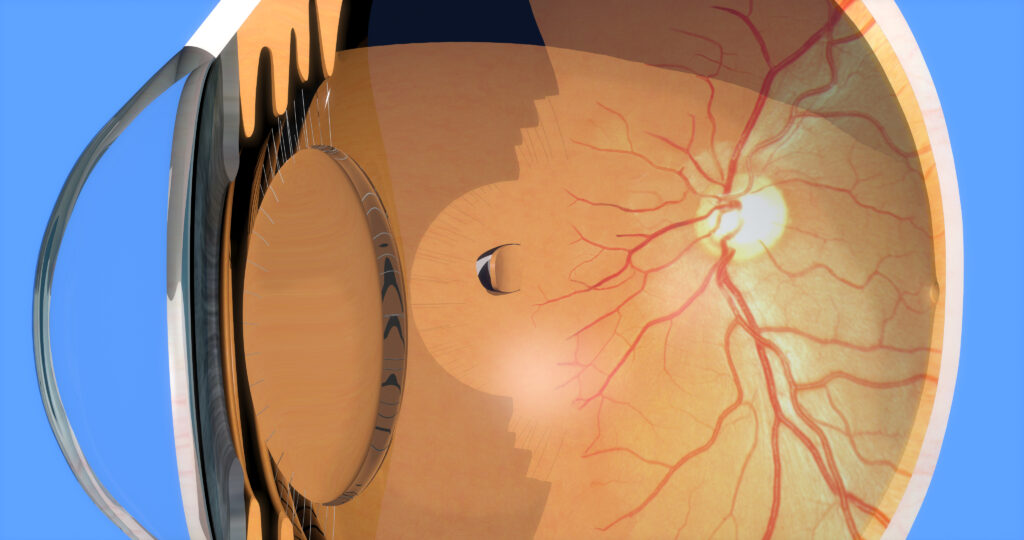Flashes, Floaters and Retinal Tears
Flashes, Floaters and Retinal Tears
Flashes, floaters, and retinal tears are three conditions that affect the eyes and can cause serious vision problems. Understanding the causes and treatments for these conditions is important for maintaining good eye health.
At Retina Consultants of Orlando, our retinal specialists have the experience and knowledge to be able to diagnose and treat these conditions to help prevent vision loss.

Floaters
What Are Floaters and What Causes Them?
Floaters are small specks, dots, or cobweb-like shapes that appear to float in the field of vision. They are most commonly noticed when looking at a plain, bright background, such as a blue sky or a white wall.

Floaters are caused by tiny bits of debris that float in the vitreous humor, a clear gel-like substance that fills the inside of the eye. This debris can be made up of clumps of collagen, a protein that helps keep the vitreous gel together, or other cellular material.
As you age, the vitreous gel can become more liquid, causing the tiny fibers that comprise this gel to clump together and cast shadows on the retina. These shadows are perceived as tiny specs in your vision, which are floaters.
Other factors that can contribute to the development of floaters include inflammation inside the eye, injury or trauma to the eye, certain eye conditions like diabetic retinopathy, and the natural aging process. In some cases, floaters can be a symptom of a more serious condition, such as a retinal tear or detachment.
If you notice a sudden increase in the number of floaters or flashes of light in your vision, it is important to see an eye doctor promptly to rule out any underlying issues.
Are Floaters a Serious Condition?
Most of the time, floaters are not a serious condition and do not require treatment. Many people will experience floaters at some point in their lives and will learn to ignore them as they become less noticeable over time.
However, in some cases, floaters can be a sign of a more serious condition, such as a retinal tear or detachment. If you notice a sudden increase in the number of floaters or flashes of light in your vision, or if you experience a sudden loss of vision or a shadow in your peripheral vision, it is important to see an eye doctor promptly to rule out any underlying issues.
Flashes
What Are Flashes and What Causes Them?
Flashes are brief flashes of light that can occur in the field of vision. They can appear as white or bright, zigzagging lines or a sudden, bright burst of light.
Flashes can be a symptom of a number of different eye conditions. Flashes can be a common symptom of migraine headaches, particularly in people who experience visual auras before or during the headache.
Flashes can also be an early warning sign of a retinal tear or detachment, which occurs when there is a tear in the retina or when the retina peels away from the back of the eye. Another possible cause for flashes is a posterior vitreous detachment, which occurs when the vitreous gel inside the eye separates from the retina.
Less commonly, flashes can be a symptom of other conditions, such as a tumor pressing on the optic nerve or a blood vessel problem. If you experience flashes of light in your vision, particularly if they are accompanied by other symptoms such as floaters, it is important to see an eye doctor promptly to determine the cause and receive appropriate treatment.
Can Flashes and Floaters Be a Sign of a Retinal Tear or Detachment?

A retinal tear occurs when the retina is torn, while a retinal detachment occurs when the retina separates from the back of the eye. Both conditions can cause flashes of light, floaters, or a shadow or curtain in the peripheral vision.
It is important to contact your eye doctor immediately if you experience any of these symptoms, as a retinal tear or detachment can lead to permanent vision loss if left untreated. Your eye doctor can perform a comprehensive eye exam to determine the cause of your symptoms and recommend the appropriate treatment.
If you have a high risk for retinal tears or detachment, such as if you have a family history of these conditions or have previously had a retinal tear or detachment, your eye doctor may recommend regular eye exams to monitor your eye health and detect any changes in your vision.
What are the Treatment Options for Flashes, Floaters, or Retinal Tears?
The treatment options for flashes, floaters, and retinal tears depend on the underlying cause and severity of the condition. Your eye doctor at Retina Consultants of Orlando will determine the best treatment method for you.
Observation
In some cases, particularly with mild floaters or flashes, your eye doctor may recommend monitoring your symptoms to see if they improve or worsen over time.
Vitrectomy
A vitrectomy is a surgical procedure that involves removing the vitreous gel and replacing it with a saline solution. This procedure may be recommended for severe floaters or if the vitreous gel is causing traction on the retina, leading to a retinal tear or detachment.
Laser Therapy
Laser therapy may be used to treat a retinal tear or detachment. The laser is used to create scars around the tear or detachment, which seals the retina to the underlying tissue and helps prevent further detachment.
Cryotherapy
In some cases, cryotherapy is necessary. Cryotherapy uses freezing temperatures to create scars around the retinal tear or detachment, which helps seal the retina to the underlying tissue and prevent further detachment.
Scleral Buckle
A scleral buckle is a silicone or plastic band that is placed around the eye to support the retina and keep it in place. A scleral buckle is often recommended for retinal detachments.
It is important to remember that if you experience flashes, floaters, or changes in your vision, it’s best to visit your eye doctor right away to get treatment and avoid possible vision loss.
Are you experiencing flashes of light or new floaters? Schedule an appointment at Retina Consultant of Orlando, in Orlando, FL, today!
